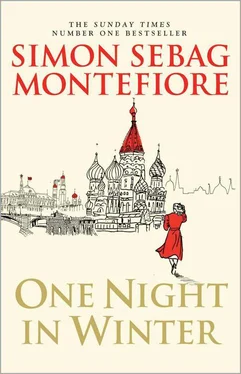‘And I thought it was just a love story,’ Abakumov repeated Stalin’s words to him from the previous day. Stalin had been implying that the Children’s Case was a serious conspiracy that Abakumov must investigate vigorously. Well, he had arrested the children – even the ten-year-old Senka Dorov – but these were VIP kids. Silk gloves were called for. Stalin was preparing for the Potsdam conference but what did he really want Abakumov to do with them? Stalin spoke in hieroglyphic codes and Aesopian fables, and even Abakumov was often bewildered by the obscurity of his intentions. Abakumov needed another clue.
The high steel gates of Little Lubianka Street were opened by guards and the car swung into the courtyard. The gates closed behind and the car doors were opened by two Chekists.
‘Take her down and register her,’ said Abakumov.
He watched Serafima Romashkina get out of the car as if she was in a trance and look around, unsure which way to go, at the high walls with the tiny barred windows and, to the side, at the rank of waiting ‘black crows’. Placing his hand on her shoulder, he pushed her gently towards two figures in long brown coats who looked like laboratory assistants. ‘That way! And don’t worry, girl. You’ll be home before you know it. It’s just routine – you know that. Don’t cry.’
The stench of detergent, distilled urine, compacted sweat – the perfume of prison life – made his nose twitch even though he knew it so well. He saw her face as it hit her for the first time. She staggered a little on her long legs and fear shadowed her green eyes. Well, prisoners were meant to be afraid, and this prison had been designed to frighten them because the power of the Knights of the Revolution had to be beyond the imaginations of the Enemies they had to break. But the main thing for him was that he was always on top. He always won. Stalin trusted him, and he believed absolutely in his own invincible destiny.
Holding her little case, Serafima walked down the steps into the lobby of the prison and stood before the counter. Its varnish was cracked, its surface greasy from the hands of thousands upon thousands of prisoners, and there were two slight indentations formed by their elbows as they leaned forward, just as this new prisoner was doing now.
‘Surname, first name, patronymic and age?’ said a brown-coated woman.
‘Romashkina, Serafima Constantinovna. Eighteen.’
She was pretty, this Serafima, thought Abakumov, but it was the mother, the film star, that he wanted. He wondered what else Serafima was saying but weren’t the words, like the tears, always the same, and hers were lost in the cacophony of doors slamming, cars arriving, locks grinding, orders barked and the crack of his boots on the stairs worn smooth by decades of unsteady feet entering the lost world for the first time.
‘Sign here, prisoner,’ said the warder. ‘Go through that door. Body search.’
The registration section worked like clockwork, thought Abakumov, who had perfected the stages that reduced a free person to a prisoner with a number: register, surrender belongings, body search, photograph. It did not matter who they were before. They might be a Polish prince, a German general, a Communist bigwig or a film-star’s daughter, but that was the glory of the Soviet State and the Party.
I am the servant of this all-powerful state, I am the sword of the Party, thought Abakumov, and I can reduce anyone to a number, to a smudge of grease on the floor. He was sorry to see this girl fed into his machine – but she had been very unwise.
He walked further into the gigantic building, and now it was quiet. He had left the registration section far behind; here the doors were no longer opened by men with keys on their belts. Now his boots sailed over blue carpet as he was saluted by men in shoulderboards and striped trousers. A secretary opened the doors of his office. He tossed some genial words at his assistant: he prided himself on his lack of formality with subordinates.
A wood-panelled office. Persian rugs, six telephones (plus a Kremlin vertushka ), a man-sized safe, a life-sized oil painting of Stalin. The chief of SMERSH lay down for a moment on the divan, crossing his legs and admiring his shiny boots.
Tonight, once he had read the interrogation reports on the children, should he watch Dynamo play football? Or go jazz dancing? He was proud of his nickname in the Dzerzhinsky Club’s dance hall where the MVD Jazz Band played the new songs: Vitya-foks-trotochnik – Victor the foxtrot-dancer. Or the theatre? Sometimes he even chatted to ordinary people during the interval.
That’s the man I am, he told himself. Unlike Beria, I have interests beyond sex and power. He had learned how to work from Beria, but now they were nearly equals. And Beria hated him.
He congratulated himself for stealing the Children’s Case off Beria. But success raised the stakes. The phone buzzed on his desk and he called out: ‘Send them in.’
It was his two chief interrogators, Komarov and Likhachev, who saluted stiffly.
‘Easy. Sit.’ He waved at them from the divan and they sat in the leather chairs. ‘Comrades, before we get on to our new prisoner, I want you to work the other brats tonight. We must have names by morning.’
They left, and on the divan, Abakumov closed his eyes. Serafima Romashkina was the key. Did she have a secret life? The Chief of Military Counter-intelligence grinned: I know something about secret lives. Everyone has one.
SENKA DOROV WAS the first to be called for interrogation that day. Even though he was ten and small for his age, he had spent the previous night in an adult cell. Twelve-year-olds could be shot and he was younger so they couldn’t shoot him but suppose the rules had changed and…
Every other second he whispered to himself aloud: Mama, where are you? I’m here. Please come and find me. I’m frightened. I love you. Do you know where I am?
These words had sustained him ever since last night, when, at home (a radiant place that now seemed far away), he had tried on his new silk pyjamas, navy blue with red piping, made in China specially for him. His mama had loved the pyjamas, she even clapped when she saw him in them and she had kissed him again and again. She always laughed with her head thrown back, making a high sound as if she was singing. Even though she was so busy, being a minister and a doctor, she always took him, Demian and Minka to school and often picked them up too.
I think I’m her favourite even though she says she loves the other three equally, he thought now. She kisses me more than them, especially Demian. Yes, they’re older but still, she says I’m irresistible. She’s the most beautiful mummy in the world, and when I’m grown up, I can marry her. (But she’s married to Papa, of course. Would Papa mind? He’s often very grumpy and gloomy, so I think not. Surely Papa would step aside?)
Last night, he’d decided to borrow a book from the neighbours so he went out on to the landing and down the stairs, still wearing his incredibly smart pyjamas and a little red and blue dressing gown to match. Minka said he was a dandy. Was that bad? ‘I’m merely a flamboyant academic,’ he’d told her.
He’d knocked on the neighbours’ door and his friend Lulu answered. Her mother was behind her.
‘Hello, Little Professor,’ said Lulu’s mother.
‘May I please borrow a book: Discussing Music, Choreography and Libretto in Tchaikovsky’s Opera and Ballet .’
‘For your parents to read?’
‘No, for me to study,’ said Senka quite seriously.
‘Don’t you like Marshak’s stories? Terem-Teremok ? Or Timur and his Team ?’
‘Those are for babies!’ he said indignantly.
Читать дальше












